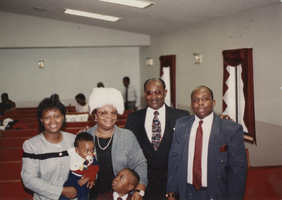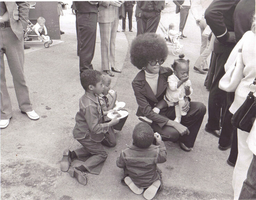Search the Special Collections and Archives Portal
Search Results
Trula McGee oral history interview
Identifier
Abstract
Oral history interview with Trula McGee conducted by Claytee D. White on March 17, 2021 for African Americans in Las Vegas: a Collaborative Oral History Project.
Trula McGee talks about her experiences growing up in a military family and her time as a student and young adult in the Westside community. She also discusses her employment as a Keno writer and runner at the Sands Hotel and Casino, Castaways Hotel and Casino, and the Silver Slipper Gambling Hall and Saloon and how this led to her meeting both Wayne Newton and Marvin Gaye.
Subjects discussed include: Carver Park; Basic High School; Nevada State Bank; Jackson Ave.; Golden West Shopping Center; Reuben's Supper Club; and Larry's Sight and Sound.
Archival Collection
Lovell Gaines oral history interview
Identifier
Abstract
Oral history interview with Lovell Gaines conducted by Claytee D. White on July 01, 2009 for the African Americans in Las Vegas: a Collaborative Oral History Project. In this interview Lovell Gaines discusses his involvement with the National Association for the Advancement of Colored People (NAACP), becoming president for the Las Vegas, Nevada chapter in 1980, segregation, Freedom Fund banquets, national conventions, police brutality, and housing issues in Las Vegas.
Archival Collection

Photograph of (left to right) April, Carrie, Josh, Johnie, Eddie, and Jeff Wright, 1991
Date
Archival Collection
Description
Color photograph of grandparents Eddie and Johnie Wright with their son, Jeff, and his three children, 1991.
Image

Photograph of Marcia Washington and her children at Dave Washington's firefighter graduation, 1974
Date
Archival Collection
Description
Black and white photograph of Marcia Washington and her children at Dave Washington's firefighter graduation in 1974.
Image

Transcript from interview with Helen Anderson and Karen Walker by Claytee White and Barbara Tabach, February 21, 2014
Date
Archival Collection
Description
Helen Anderson came to Las Vegas in 1962 from Arkansas, and had her daughter, Karen, in 1967. The pair discusses the family business, Hamburger Heaven, and other businesses on Jackson Street and the Westside. They also talk about hte changes in the neighborhood and their work with the West Las Vegas Citizens for Hope group, and Karen's family services business.
Text
